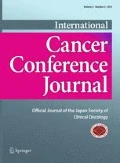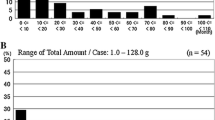Abstract
The Japanese guideline for gastroenteropancreatic neuroendocrine tumor treatment recommends everolimus or sunitinib as first-line treatment for unresectable pancreatic neuroendocrine tumors (PNETs). Streptozocin (STZ) is recommended as an alternative. We encountered a patient with PNET who had multiple liver metastases and who showed a remarkable response to third-line STZ. The patient was a 50-year-old man with a pancreatic head tumor 32 mm in diameter. We planned to perform subtotal stomach-preserving pancreaticoduodenectomy, but abandoned resecting the pancreas during the surgery upon discovering a small liver tumor 3 mm in diameter, examination of frozen sections of which revealed a poorly differentiated adenocarcinoma. However, the final pathological examination revealed that the liver nodule was a PNET; hence, we completed the subtotal stomach-preserving pancreaticoduodenectomy 5 weeks after the first laparotomy. The patient received no adjuvant chemotherapy after surgery. Twenty-one months later, we discovered 20 scattered liver metastases via computed tomography; these were considered unresectable. Therefore, we administered everolimus for 7 months, but the patient developed interstitial pneumonia and experienced metastatic progression. Subsequent sunitinib administration for 6 months was ineffective. Finally, we chose STZ (1000 mg/m2, weekly) as a third-line treatment, which produced a partial response for 10 months. The patient remains alive 38 months after the detection of recurrence. As the order in which anti-cancer drugs should be administered to treat PNET has not been determined, additional predictors of their therapeutic efficacy should be investigated.




Similar content being viewed by others
References
Ito T, Igarashi H, Nakamura K (2015) Epidemiological trends of pancreatic and gastrointestinal neuroendocrine tumors in Japan: a nationwide survey analysis. J Gastroenterol 50:58–64
Ito T, Sasano H, Tanaka M (2010) Epidemiological study of gastroenteropancreatic neuroendocrine tumors in Japan. J Gastroenterol 45: 234–243
Japanese Neuroendocrine Tumor Society (2015) JNETS 2015 guidelines for the pancreas and intestine. https://jnets.umin.jp/pdf/guideline001_1s.pdf
Yao JC, Phan AT, Chang DZ (2008) Efficacy of RAD001 (everolimus) and octreotide LAR in advanced low- to intermediate-grade neuroendocrine tumors: results of a phase II study. J Clinical Oncol 26:4311–4318
Ito T, Okusaka T, Ikeda M (2012) Everolimus for advanced pancreatic neuroendocrine tumours: a subgroup analysis evaluating Japanese patients in the RADIANT-3 trial. Jpn J Clin Oncol 42:903–911
Raymond E, Dahan L, Raoul JL (2011) Sunitinib malate for the treatment of pancreatic neuroendocrine tumors. New Engl J Med 364:501–513
Moertel CG, Lefkopoulo M, Lipsitz S (1992) Streptozocin–doxorubicin, streptozocin–fluorouracil or chlorozotocin in the treatment of advanced islet-cell carcinoma. New Engl J Med 326:519–523
Aoki T, Kokudo N, Komoto I (2015) Streptozocin chemotherapy for advanced/metastatic well-differentiated neuroendocrine tumors: an analysis of a multi-center survey in Japan. J Gastroenterol 50:769–775
Lloyd RV, Osamura RY, Klöppel G (2017) WHO classification of tumours of endocrine organs 4 World Health Organization IARC Press, Lyon France
Ito T, Okusaka T, Nishida T (2013) Phase II study of sunitinib in Japanese patients with unresectable or metastatic, well-differentiated pancreatic neuroendocrine tumor. Invest New Drugs 31:1265–1274
Shibuya H, Hijioka S, Sakamoto Y (2018) Multi-center clinical evaluation of streptozocin-based chemotherapy for advanced pancreatic neuroendocrine tumors in Japan: focus on weekly regimens and monotherapy. Cancer Chemother Pharmacol 82:661–668
Stupp R, Mason WP, van den Bent MJ (2005) Radiotherapy plus concomitant and adjuvant temozolomide for glioblastoma. New Engl J Med 352:987–996
Kulke MH, Hornick JL, Frauenhoffer C (2009) O6-methylguanine DNA methyltransferase deficiency and response to temozolomide-based therapy in patients with neuroendocrine tumors. Clin Cancer Res 15:338–345
Kawashima Y, Ishikawa H, Hisaka T (2016) Treatment strategy for non-functional pancreatic neuroendocrine tumors (P-NET) at Kurume University Hospital. Jpn J Cancer Chemother 43:107–110
Acknowledgements
We are grateful to Professor Kamiyama from Hokkaido University for his kind and fruitful comments during the presentation of our paper’s data at the 55th Annual Meeting of the Japan Society of Clinical Oncology.
Funding
The study received no financial support.
Author information
Authors and Affiliations
Corresponding author
Ethics declarations
Conflicts of interest
The authors declare that they have no conflict of interest.
Ethical approval
All procedures performed in studies involving human participants were in accordance with the ethical standards of the institutional and/or national research committee and with the 1964 Helsinki Declaration and its later amendments or comparable ethical standards.
Informed consent
Informed consent was obtained from the patient reported in this study.
Additional information
Publisher's Note
Springer Nature remains neutral with regard to jurisdictional claims in published maps and institutional affiliations.
About this article
Cite this article
Nagata, H., Einama, T., Hoshikawa, M. et al. A patient with a pancreatic neuroendocrine tumor and multiple liver metastases achieved a long-term partial response to third-line streptozocin treatment. Int Canc Conf J 9, 45–49 (2020). https://doi.org/10.1007/s13691-019-00391-5
Received:
Accepted:
Published:
Issue Date:
DOI: https://doi.org/10.1007/s13691-019-00391-5




